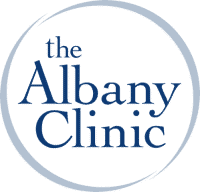Treatment Resistant Depression
What is Treatment-Resistant Depression (TRD)?
Treatment-Resistant Depression (TRD) is a form of major depressive disorder (MDD) that does not respond to treatment with at least two different antidepressant medications from separate drug classes. Individuals with TRD continue to experience persistent depression symptoms despite following an approved treatment regimen, leading to significant challenges in daily functioning, mental well-being, and personal relationships.
At The Albany Clinic, we specialize in advanced treatments for TRD, offering innovative therapies designed to help those who have not found relief through conventional medications.
Current TRD Treatment Options
For almost 60 years the only available medications for the treatment of patients with depression have been Selective Serotonin Reuptake Inhibitors (SSRI) and Selective Norepinephrine Reuptake Inhibitors (SNRI). SSRI medications include Zoloft®, Paxil®, Celexa®, Prozac®, and Lexapro®, among others. SNRI medications include Effexor® and Cymbalta®, among others. While these medications are commonly prescribed, only about a quarter of the patients who take these medications achieve remission from their symptoms of depression.
Unfortunately, individuals who suffer from Treatment-Resistant Depression rarely find relief using either of these types of medications. In response, physicians will often try modifying the patient’s medication regimen by increasing the dosage of currently prescribed medication, adding another antidepressant, or prescribing a medication that is typically prescribed for another condition. Some form of psychological counseling will often be used in conjunction with prescribed medications, the most common being Cognitive Behavioral Therapy (CBT) and Prolonged Exposure Therapy (PET).
Why Choose The Albany Clinic for PTSD?
At the Albany Clinic, we treat Treatment-Resistant Depression with IV Drug Infusion Therapy. IV Drug Infusion Therapy delivers medications as a constant infusion. Ketamine is the primary medication used in these infusions, and it achieves rapid symptom relief. There are now dozens of studies that have been performed in multiple countries which have demonstrated ketamine’s efficacy. Ketamine has a distinct advantage over the traditional medications used because of the rapidity with which it relieves symptoms.
Another innovative treatment we offer at The Albany Clinic is Transcranial Magnetic Stimulation (TMS) Therapy, a highly effective, non-invasive treatment for depression. TMS uses magnetic pulses, similar in strength to those in MRI machines, to stimulate underactive nerve cells in the brain's mood-regulating regions. This targeted stimulation helps alleviate symptoms of depression, particularly in individuals with Treatment-Resistant Depression (TRD).
Clinical studies have shown that TMS therapy boasts an impressive 82% success rate in treating individuals who have not responded to traditional antidepressant medications.
At The Albany Clinic, we are committed to providing cutting-edge mental health treatments to help our patients regain control over their lives.
Both can be life saving, especially when suicidal ideation is present.





